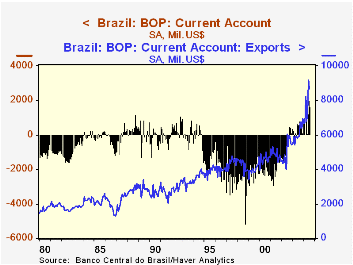 Global| Aug 25 2004
Global| Aug 25 2004Brazil Maintains Record Range for Current Account Surplus
Summary
Brazil's current account showed a US$1.628 billion surplus in July, according to data reported this morning by Banco Central do Brasil. This is down from June's record $1.959 billion, but still notably larger than any previous month. [...]

Brazil's current account showed a US$1.628 billion surplus in July, according to data reported this morning by Banco Central do Brasil. This is down from June's record $1.959 billion, but still notably larger than any previous month. The balance in May was $1.206 billion, but only a very few scattered months in nearly 25 years of history have had a surplus of $1.0 billion or more.
The trade accounts are the source of the improvement; both exports and imports have been growing in recent months, but obviously exports have had the greater gain. The graph shows clearly a strong, well established uptrend in exports. Brazil's industrial production data suggest that, contrary to the historical vision of coffee and cocoa as the leading products of Brazil, today, the fastest growing sectors of its industry relate to machinery and capital goods.
While the trade portion of Brazil's external accounts has improved markedly, other components remain in deficit. The services account is maintaining a modest deficit of about $400 million per month. The income account deficit hovers around $1.7 billion monthly; it has been hurt recently by net outflows of profits, and dividends and the country's interest bill has been increasing recently after some period of easing.
Brazil's overall balance of payments contains a deficit now in the financial accounts. This might be dismissed as simply the mirror image of the emergence of the surplus in the current account. The "other investments" category that includes trade credit and short-term loans is indeed in the negative position one would expect as a counter to the current account. But in addition, the volume of direct investment has diminished considerably in the past year and portfolio investment recently shows net outflows.
So the emergence of a trade surplus due to strong exports indicates an underlying improvement for the Brazilian economy, but it appears that investors are still unsure of the country's markets.
[These data are all contained in Haver's EMERGELA database. Haver performs the seasonal adjustment on the actual figures reported by the Central Bank.]
| Bil.US$ | Seasonally Adjusted Monthly Average|||||||
|---|---|---|---|---|---|---|---|
| July 2004 | June 2004 | May 2004 | July 2003 | 2003 | 2002 | 2001 | |
| Current Account | 1.628 | 1.959 | 1.206 | 0.616 | 0.342 | -0.640 | -1.934 |
| Trade Balance | 3.405 | 3.484 | 2.736 | 2.034 | 2.069 | 1.097 | 0.221 |
| Exports | 8.683 | 9.179 | 7.385 | 5.901 | 6.090 | 5.030 | 4.852 |
| Imports | 5.278 | 5.696 | 4.649 | 3.867 | 4.021 | 3.933 | 4.631 |
| Services | -0.345 | -0.429 | -0.121 | -0.310 | -0.425 | -0.413 | -0.647 |
| Income | -1.697 | -1.419 | -1.711 | -1.503 | -1.546 | -1.516 | -1.645 |
| Financial Account | -1.522 | -2.521 | -2.240 | -0.774 | 0.407 | 0.696 | 2.257 |
Carol Stone, CBE
AuthorMore in Author Profile »Carol Stone, CBE came to Haver Analytics in 2003 following more than 35 years as a financial market economist at major Wall Street financial institutions, most especially Merrill Lynch and Nomura Securities. She had broad experience in analysis and forecasting of flow-of-funds accounts, the federal budget and Federal Reserve operations. At Nomura Securities, among other duties, she developed various indicator forecasting tools and edited a daily global publication produced in London and New York for readers in Tokyo. At Haver Analytics, Carol was a member of the Research Department, aiding database managers with research and documentation efforts, as well as posting commentary on select economic reports. In addition, she conducted Ways-of-the-World, a blog on economic issues for an Episcopal-Church-affiliated website, The Geranium Farm. During her career, Carol served as an officer of the Money Marketeers and the Downtown Economists Club. She had a PhD from NYU's Stern School of Business. She lived in Brooklyn, New York, and had a weekend home on Long Island.
More Economy in Brief
 Global| Feb 05 2026
Global| Feb 05 2026Charts of the Week: Balanced Policy, Resilient Data and AI Narratives
by:Andrew Cates





